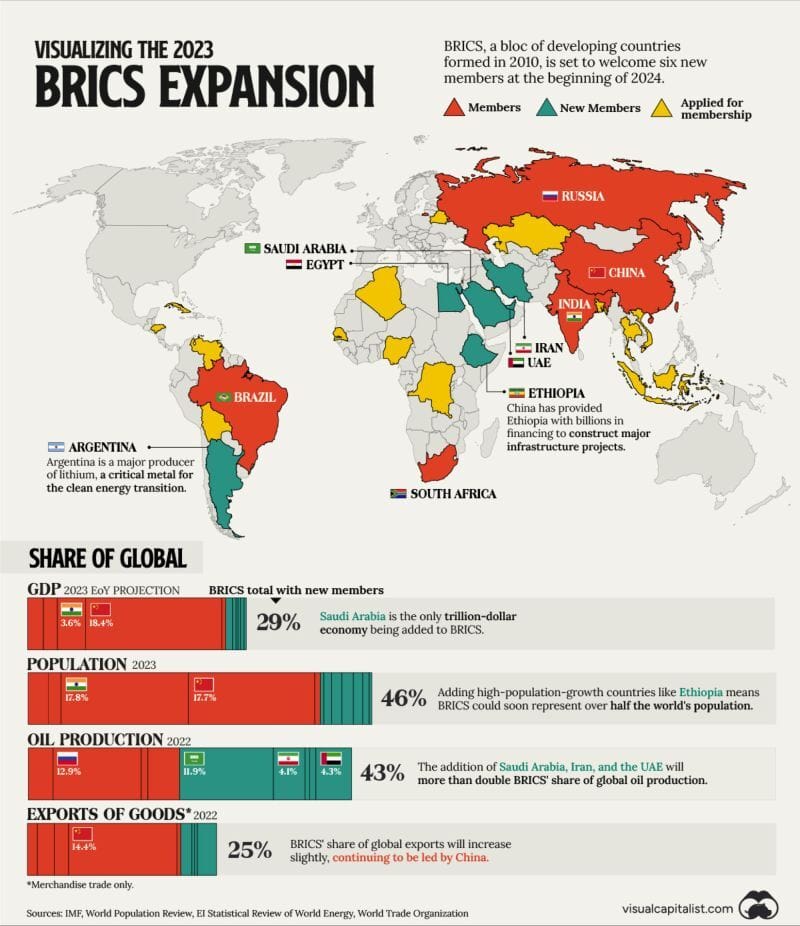- The Africa Brief
- Posts
- Africa's Week In Brief
Africa's Week In Brief
Eritrea | Eswatini | G20 | Rwanda | Taiwan
Dear Friends,
For those new to the Africa Brief, we’ve recently started a new briefing style. Every second Thursday you’ll get a short summary of this week’s news from the continent as well as our Graphic of the Week. That same Friday, Josh Parker Allen releases a longer form analysis — “A closer look”. Tomorrow’s piece considers the latest coup in Gabon. Be sure to tune in for it.
We love writing for you, but we need a bit of help. If you enjoy the Briefing, please do share it far and wide (LinkedIn, Twitter, etc.) using the link below.
Too Long; Didn’t Read
Democratic Republic of Congo (DRC). 40 Congolese died in a crackdown on anti-UN movements in eastern DRC – 160 people were reportedly arrested amidst the protests (DW).
Eritrea. Israel is considering the immediate deportation of Eritrean asylum seekers who were involved in riots in Tel Aviv on Saturday. Some 170 people were injured in violent clashes with police and in-fighting between groups of supporters and opponents of the Eritrean regime (BBC).
Eswatini. Taiwanese President Tsai Ing-wen will visit Eswatini, the island’s last African ally. Eswatini’s absolute monarchy rules the country with an iron fist (Reuters).
Kenya. The Africa Climate Summit has officially kicked off this week in Nairobi. Focus has been on a “just energy transition” for the continent, the availability of financing, and demands to support the electrification of African economies (some 600 million people lack access to electricity) (ACS).
G20. Nigerian President Bola Tinubu and South African President Cyril Ramaphosa head to the G-20 Leaders’ Summit in New Delhi, India. Nigeria is considering whether to apply to the Group (Reuters).
Gabon. General Brice Oligui Nguema, who came to power in a coup last week, pledged to return the country to civilian rule (without providing a timeline). More in tomorrow’s Africa Brief. (Africa News).
Niger. France is in talks with Niger’s junta to withdraw some of its 1,500 troops from the country. The soldiers were stationed in Niger to fight jihadists in the region. France, the former colonial power, refuses to recognise the junta (The Economist).
Russia-South Africa. In a speech to the country, President Ramaphosa says no evidence has been found showing that South Africa sold weapons to Russia — contrary to claims by the US ambassador in Pretoria. The President said that the cargo ship in question was transporting Russian weapons to South Africa to fulfill an order from 2018 (BBC).
Rwanda. President Paul Kagame retired hundreds of military personnel after last Wednesday’s military coup in Gabon. Cameroon’s leader took similar steps, updating key appointments in the country’s defense ministry (All Africa News).
South Africa. The economy hobbles on posting meagre growth of 0.6% over the previous three months. Ongoing power cuts and volatile commodity prices have contributed to the country’s weak economic performance (Bloomberg).
Sudan. The UN Refugee Agency and 64 humanitarian and civil society groups are raising $1 billion to provide essential aid and protection to over 1.8 million people fleeing the ongoing conflict in Sudan (UN News).
UK-South Africa. A deal between the two countries shows a renewed UK push to secure critical minerals for the energy transition (BusinessDay).
US-DRC. Ground was broken in the construction of a massive embassy in Kinshasa, DRC. The project is being called ‘a symbol of our [the US and DRC's] shared commitment to advancing democratic values, sustainable economic growth and global cooperation’ (News24).
Graphic of the Week

Source: Visual Capitalist
In Context: Xi Jingping’s snubbing of the G20 invitation is an indication of two trends. The first is that China’s domestic economic troubles are having political implications for the party Xi leads — requiring him to spend more time in Beijing (Foreign Policy). The second trend concerns Beijing’s foreign policy position and the desire to have the BRICS+ assert itself in the new world order. The BRICS is widely seen as a rival to the G20, an artifact of the “rules based international order”. The announcement of the BRICS expansion to include six new members will see the bloc’s combined expected GDP climb slightly over $30.8 trillion, enough for a 29.3% global share. The additions of Ethiopia (126.5 million people) and Egypt (112.7 million people) would see the bloc represent just under half of the world’s population.
Reply